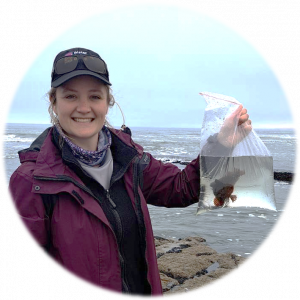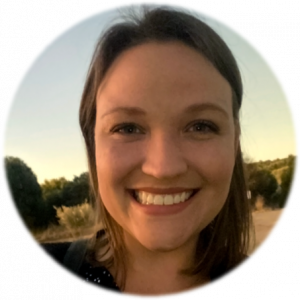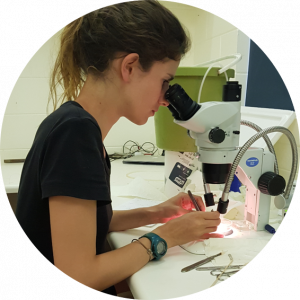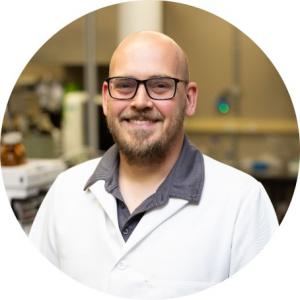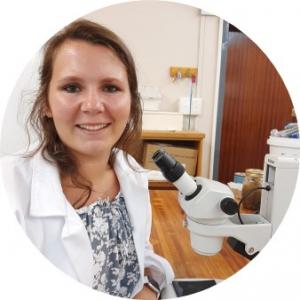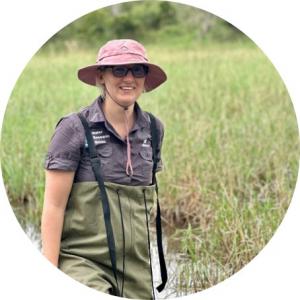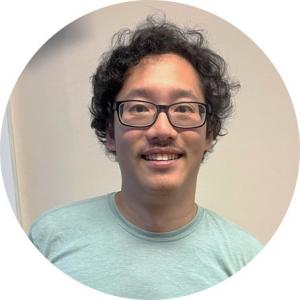Dr Anja Erasmus
Email address: 23599235@mynwu.ac.za |
Field of expertise: Gnathiidae, Integrated Taxonomy, Scientific Illustration, Environmental parasitology Overview: Anja is currently serving as a Postdoctoral Research Fellow at the North-West University, exploring the gnathiid diversity of coral reefs around the world. She has a passion for taxonomy and enjoys illustrating these tiny cryptofauna. The broad focus of her research includes Environmental Parasitology to determine the effects of pollution on parasites and ecosystems. She enjoys combining her creative and organisational talents in the field of science. Being in nature and taking part in nature- and ocean conservation touch her heart deeply. Previous research experience: Anja completed a B.Sc. with majors in Zoology, Geography and Tourism in 2014 and a B.Sc. Hons in Biodiversity and Conservation Ecology at North-West University in 2015. Anja subsequently proceeded to a M.Sc. degree and her research assessed the trophic transfer of metals and organochlorine pesticides in intertidal rocky shore organisms by using stable isotopes. Her Ph.D. project, in collaboration with Prof Bernd Sures (Universität Duisburg-Essen in Germany), addresses the use of Clinus superciliosus as model organism to environmental parasitology within marine ecosystems. |
|
Field of expertise: Marine parasitology, Taxonomy, Biodiversity, Genetics, Morphology, Fish parasites Overview: Anja Vermaak is a postdoctoral research fellow at North-West University, specialising in the diversity of parasites infecting marine fishes. Her research focuses on identifying these parasites through morphological and genetic characterisation (taxonomy). Driven by curiosity and a passion for conservation, Anja aims to advance our understanding of marine biodiversity and its ecological significance. Previous research experience: Anja earned her BSc degree in Zoology and Microbiology, followed by a BSc Honours in Environmental Sciences with a focus on Aquatic Ecosystem Health at North-West University. She then pursued an MSc in Environmental Sciences, where her research investigated the diversity of trematodes (flatworms) infecting the super klipfish (Clinus superciliosus) in South Africa. For her PhD, she studied the diversity of metazoan parasites infecting the Cape white seabream (Diplodus capensis) and explored how these parasite communities vary between marine protected and non-protected areas. |
Dr Anja Vermaak
Email address: 25476076@mynwu.ac.za |
Dr Clarisse Louvard
Email address: 55214770@mynwu.ac.za |
Field of expertise: Transcriptomics, Gene evolution, Trematoda, Digenea, Isopoda, Taxonomy, Systematics, Life-cycles Overview: Dr Louvard is a Postdoctoral Fellow in parasite transcriptomics and mitogenomics at NWU, hosted by Prof. Nico J. Smit (UESM-WRG), as well as the co-manager of the WRG Molecular Lab under Prof. Courtney Cook. She studied marine sciences at the INTECHMER Institute in France, then went on to work at the French National Museum of Natural History (MNHN). She started a Bachelor of Marine Biology at SKEMA Business School (Nice, France) and graduated from the University of Queensland (UQ) (Brisbane, Australia). She obtained both her BSc. (Honours) in Marine Science and her Ph.D. in trematode transcriptomics, taxonomy and life cycles at UQ under the primary supervision of Associate Prof. Thomas H. Cribb. Past research experience: Dr Louvard worked as a research assistant in microalgae identification at the MNHN, where she also served as a water-quality consultant for local city councils. During that time, she also participated in public outreach events during various MNHN-related events and for marine environmental organisations. After her Ph.D., she worked as a consultant on microalgae for the aquatic environments consulting firm SLR (then FRC Environmental) in Cleveland, Queensland (Australia). She is also a scuba-diving instructor (FFESSM). |
|
Field of expertise: Aquatic Ecotoxicology, Mining pollution, Mercury, Platinum Group Elements Overview: Dr Hannes Erasmus has always been intrigued and passionate about how contaminants affect aquatic ecosystems and the biota living in these systems. Since South Africa has several mining activities and mineral extraction processes, the aquatic ecosystems normally in the vicinity of these activities are under threat. He continued with a Postdoctoral Research Fellowship at the North-West University, South Africa, on how mercury is entering aquatic ecosystems and how this pollutant affects biota on different trophic levels, through an NRF Scarce Skills Postdoctoral Fellowship. The biota he assesses for metal pollutants include aquatic plants, macroinvertebrates, fish and their associated parasites. In 2024, he was appointed as an Assistant Professor at Hokkaido University for four months and received an NRF Research Excellence Award for Early Career/Emerging Researchers. Previous research experience: In his B.Sc. Honours and M.Sc. degrees, he focused on the effects of gold mining activities on freshwater systems, while his Ph.D. focused on the exposure and effects of platinum mining on aquatic ecosystems. He has extensive experience in assessing various aspects of aquatic ecosystems for several private and government consultation companies across South Africa, as well as Africa (Madagascar and Tanzania). Dr Hannes is involved in the training of undergraduate students in Aquatic Ecology, as well as postgraduate students in Sustainable Development and Aquatic Ecotoxicology in South Africa, Madagascar, Germany, and Vietnam. He is passionate about training the new generation of up-and-coming researchers in the field of Aquatic Ecotoxicology on various chemical analytical instrumentation and techniques. |
Dr Hannes Erasmus
NRF rating: Y-rated Email address: 22119809@mynwu.ac.za |
Dr Marelize Marsay
Email address: 24279862@mynwu.ac.za |
Field of expertise: Ecotoxicology, invertebrates, pesticides Overview: Dr Marelize Marsay is currently a postdoctoral fellow at the Water Research Group focusing on behavioural ecotoxicology. She has experience in water quality assessment, metal and pesticide pollution and analysis, acute and chronic laboratory experiments, as well as behavioural studies. Her project is on linking the effects of two pesticides on aquatic macroinvertebrates using the Adverse Outcome Pathway framework. Previous research experience: She completed her BSc Honours, Masters, and Ph.D. as part of the Water Research Group under the supervision of Prof Victor Wepener (North-West University) and Prof Paul van den Brink (Wageningen University, Netherlands). |
|
Field of expertise: Biodiversity inventory of undiscovered freshwater fish parasites, Monogenea, Taxonomy, Alien and invasive species, Molecular characterisation Overview: Dr Marliese is part of the REFRESH project, funded by the Foundational Biodiversity Information Programme (FBIP). The study incorporates traditional techniques for identifying parasitic species, evaluating parasitic community assemblages, and introduces a novel sub-discipline known as historical ecology of parasitism. This sub-discipline aids in characterizing and monitoring changes in parasitic communities among freshwater fishes in South Africa over time. The project's goal is to revitalize and address research gaps in understanding freshwater species in South Africa, crucial for biodiversity assessments and informing ecosystem conservation. The research is grounded in the recognition that South African rivers harbor diverse and unique freshwater fishes, including numerous endemic species. Despite this richness, there is a lack of comprehensive knowledge regarding the parasitic communities within these ecosystems. Past biodiversity assessments that excluded parasites have proven detrimental. These minuscule organisms significantly contribute to biomass functioning and food web connectivity in ecosystems. Including them in biodiversity assessments is essential for generating accurate data sets, enabling precise predictions about shifts and the fate of aquatic ecosystems and their associated biodiversity in the future. Previous research experience: She completed her B.Sc. Zoology and Microbiology, B.Sc. (Honours) and M.Sc. in Environmental Science and her Ph.D. (cum laude) at the North-West University in collaboration with the South African Institute for Aquatic Biodiversity from 2014-2022. |
Dr Marliese Truter
Email address: 23378123@mynwu.ac.za Affiliations: SAIAB |
Dr Russell' Q-Y. Yong
NRF rating: Y-rated Email address: 49933884@mynwu.ac.za |
Field of expertise: Marine, parasitology, digenea, trematode, taxonomy, systematics Overview: Dr Yong’s primary research interests pertain to the discovery and taxonomic and phylogenetic characterisation of parasitic flatworms (Digenea) which infect fish, though have some (limited) experience with other parasitic taxa as well (nematodes, copepods, isopods). Having lived in Australia for the past 18 years, focus in South Africa will be to tap into the rich, little-characterised fauna of fish parasites present in marine systems. Previous research experience: Postgraduate study (Honours and PhD) was completed in The University of Queensland (Australia) working extensively on the blood fluke (Aporocotylidae) fauna of shallow-water marine fishes. |
Last updated: February 2025
Comments on the content and accessibility, please contact: Anja Erasmus


